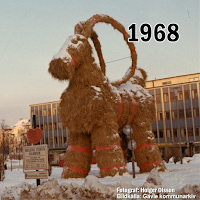Me, Mastodon, and the Gavle Goat
Me, Mastodon, and the Gavle Goat
What is the Gävle Goat anyway?
The Gävle Goat is a large straw goat erected as a Christmas display in the town of Gävle in Sweden. It’s a representation of the traditional Yule Goat - or Julbocken - which features in various Yule and Christmas traditions in Scandinavia.
Back in 1966 Stig Gavlén, an advertising consultant, came up with the idea of building a large Yule Goat display to attract people to the local shops and restaurants. On 1 December 1966, the local fire department erected the first Gävle Goat. It was 13-metres high, 7 metres long, and weighed 3 tonnes. Impressive! It stood through to the 31st of December, when a vandal burned it down.
And so were two traditions born. 1 - Building a giant straw goat, and 2 - illegally burning it down. I won’t go through all the times it burned since then - they’re listed out on the goat’s Wikipedia page. But people being what they are, the burning of the goat is what’s put it on the map. Otherwise it would just be an admittedly impressive, but obscure Christmas display in a place not many people ever heard of.
It’s burned or been otherwise destroyed 38 out of 57 times now. Notable incidents include the use of flaming arrows to bypass the protective fence. A DoS attack on the goat’s webcam to cover the arsonists. An American tourist whose Swedish friends persuaded him that burning the goat was perfectly legal, and who fled home without paying the fine. Presumably to this day he’s persona non grata in Sweden. And in 2010 a plan to steal the goat by helicopter and take it to Stockholm was foiled by the security guard refusing a bribe to leave his post. Presumably averting civil war breaking out between Gävle and Stockholm.
How Did I First Hear about the Goat?
That would be thanks to Mr Jim Moon, of the Hypnogoria website and family of podcasts, which cover folklore, especially of the spooky variety, and horror. He talked about the tradition on a podcast a while ago, then reminded me of it again more recently in his 2022 Advent calendar series.
That sent me to check out more information about it, and that led me to the Gävle tourist website and the dedicated Gävlebocken page. That included a live feed of a webcam watching over the goat and I was immediately hooked!
 |
| The live feed showing the goat with the Gavle theatre in the background. Areas are pixellated to protect the privacy of passers by. |
GoatWatch 2022
The goat has a Twitter, where whoever was running that account tweeted as the goat, and if I’d still been on Twitter I expect I’d have just started following that account and that would have been it. But I’d already deactivated my twitter by then. So I decided to start posting a daily update on Mastodon. Just a short toot usually starting with “Has the Goat burned?” and an update about if it had survived the night.
I started adding hashtags and a picture, captured from the live feed, remembering to include an alt text description. Later I started adding banners to the image that showed the date. It was fun, getting me engagement, giving me something to post. I got a couple of new followers. All good stuff.
The Goat Must Live!
But as time went on I became more emotionally invested. I wanted that goat to survive. On Twitter some people responding to the goat’s tweets very much wanted the goat to burn. They were positively threatening. One challenged the goat to “come out to this side of that fence, you coward.” Even on Mastodon there were quite a few firebugs hoping to see it go up in flames. And I confess, I could well have been one of them in the past. Fire is spectacular. It feeds the base lusts of the goblin inside.
Did the goat burn?
No! The goat made it through. It celebrated the solstice, Christmas, Yule, Advent, New Year’s Eve and New Year’s Day suffering no more than the vicissitudes of the Swedish winter weather. On 2nd of January 2023 it was dismantled. The frame is stored away for the next Christmas, while the straw is taken to a local heating plant to be burned for heating for the town. So part of it does burn, but in a constructive way - and not while it’s a goat.
 |
| Gone Goat |
I’ll be back for GoatWatch 2023
Meanwhile, go and check out Hypnogoria, (the site and the podcasts) because there's enough there to keep you busy all year.







